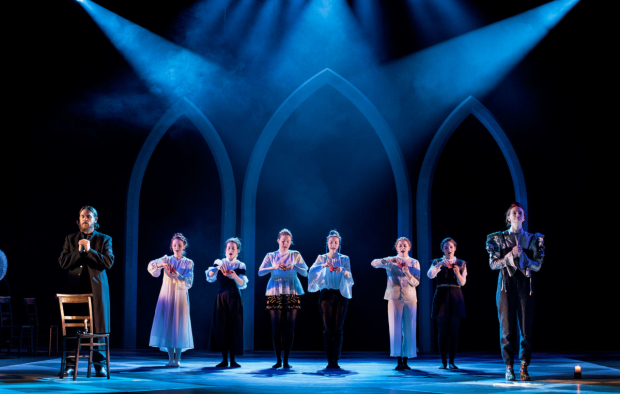Review: Glory on Earth (Royal Lyceum Theatre, Edinburgh)
David Greig directs Linda McLean’s play about the Catholic Mary Queen of Scots and Protestant reformer John Knox

© Drew Farrell
The second half of Britain’s sixteenth century is such brilliantly fertile ground for drama because of the unique set of circumstances that converged there. Having (almost) never had a queen regnant before, suddenly both England and Scotland had one at the same time, and dramatists from Schiller onwards have explored the fascinating relationship of the two queens, Elizabeth Tudor of England and Mary Stuart of Scotland, who never actually met. Linda McLean’s new play, however, explores a series of meetings that did take place, a series of equally titanic clashes, and very uncomfortable they must have been.
The Catholic Mary, Queen of Scots, and the firebrand Protestant reformer John Knox, make brilliant antagonists. They’re opposites in almost every way, in temperament as well as in religion, and destiny set them at loggerheads right from the moment of Mary’s return to Scotland after her marriage to the Dauphin of France. The two met five times, and McLean’s main source for Glory on Earth is Knox’s account of their conversations, in which not only does he record all the words, but he also, in a peak of patriarchy, imputes certain thoughts and feelings onto the queen. Consequently, McLean describes her play as "Mary’s howl of unsilencing" and, while it would be too simple to describe the play as merely feminist, it’s significant that all but one of the actors are female, and Mary’s insight towards the end is that "the men in this realm will betray me."
McLean’s big structural innovation is to place at the centre of the action a female chorus who play all the other roles, from courtiers to reformers to Privy Councillors. More importantly, however, they also act as the externalisation of Mary’s own thoughts, and the queen’s dialogue flows in and out of theirs symbiotically. It’s very effective, and reinforces this as a woman’s "unsilencing" of a previously male story.
However, McLean also tries to personalise Knox, too, and I found this more compelling than her treatment of Mary. Far from the ranting pulpit-thumper, Jamie Sives’ Knox raises his voice only once in the whole play, and he reflects movingly on how God tested him through the death of his wife. Next to him, Rona Morison’s Mary is strong willed and determined, but still flighty and, ultimately, remains a victim of those around her.
Their dichotomy is a clever way to structure this exploration of a key moment in Scottish history, and the play’s most compelling moment is the only one where Mary and Knox are totally alone on stage. It’s a word-heavy play, however, and while that’s not a bad thing in itself, it rendered some of the direction a bit superfluous. Much of the staging is bare and empty, barring a few arches and a central plinth which appears and disappears bearing a central symbol (a throne, an executioner’s block…). Much was made of this being the first play that David Greig has directed since taking over as artistic director of the Lyceum, but for much of the action I wondered whether it wouldn’t have been just as successful as a radio play.
Glory on Earth runs at the Lyceum in Edinburgh until 10 June.













